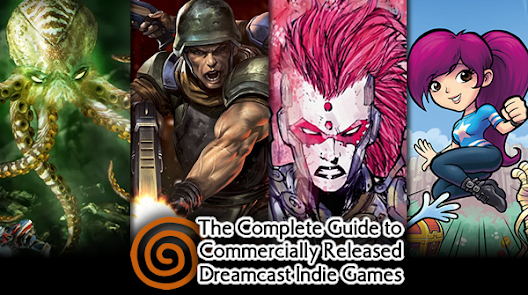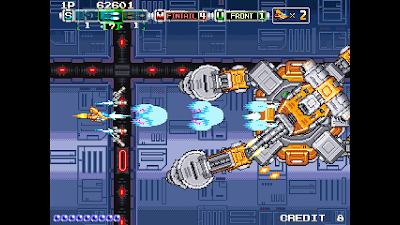With the recent announcement that a true Flashback sequel (imaginatively titled Flashback 2) is heading our way in late 2022, we thought it appropriate to cast our minds back to the recent past and take another look at the officially sanctioned Flashback titles released on the Dreamcast.
It's not really common knowledge that Flashback was given a full physical release, complete with a hyper fragile PAL case, back in 2017. Well regarded publisher JoshProd was behind this fantastic edition of Delphine Software's sprite based action adventure, and the release was even given a full seal of approval by original creator Paul Cuisset.
We reviewed the game at the time, and gushed at the lovingly crafted package. From the excellent (and authentic) box art and printed disc, to the additional extras lavished upon the Dreamcast remaster, it really was excellent and packed with content.
This included such notable features as a full and uncut intro cinematic (previous console versions featured a cut down intro from the Amiga version), the option to enable pre-rendered cut scenes from the PC release, full voice acting, alternative soundtracks, 16-bit emulated versions, and quick saves using the VMU.
Furthermore, quality of life improvements came in the form of numerous graphic filters and fully customisable controls. Underneath all the polish though, Flashback for Dreamcast was/is just plain old Flashback...but when 'plain old' Flashback is as good as it is, that's no bad thing.
The release of Flashback on Dreamcast went almost unnoticed by the mainstream gaming press though, and it was quickly forgotten about as the game was subsequently ported to modern platforms such as the Nintendo Switch. Naturally, the Dreamcast is a bit of a niche system these days so that's understandable, but the fact remains that the Dreamcast port of Flashback is as solid as they come and could arguably be viewed as the blueprint for the current gen re-releases that came after it.
What hapenned next was similarly seemingly ignored in the main - the 1995 follow up to Flashback, titled Fade to Black, was also given a fully approved 'official' physical release on Dreamcast. Fade to Black first came to the PC and PlayStation in the mid-nineties to some moderate success, eschewing the prequel's side on, rotoscoped gameplay for a more modern (for the time) leap into 3D.
Once again assuming the role of main protagonist Conrad B. Hart, players of Fade to Black were thrown into another sci-fi adventure involving the wanton shooting of old foes the Morphs, solving of simplistic puzzles, finding keys and getting hopelessly lost...but this time from a pseudo over-the-shoulder perspective.
Again released by JoshProd and given full approval by the rights holder and designer Delphine Software and Paul Cuisset, Fade to Black on Dreamcast was released in 2018 to very little in the way of fanfare outside of the Dreamcast community. The Dreamcast release, in a similar fashion to the prequel, is a sort of mash-up of the other versions of the game, with the main bulk of the game seemingly based on the PC iteration.
This is especially evident in the comparatively clean visuals and relative lack of severe pixellation and texture warping associated with a lot of PlayStation titles. Something that sets this game apart from the other indie Dreamcast releases of the era is that it is indeed a fully 3D game, that runs well on the Dreamcast and showcases just how well the Dreamcast might be used for the porting of other classic DOS or Windows games (something that has come to further fruition with the recent release of Postal).
Controls can take a bit of getting used to, especially since the game employs a Soldier of Fortune style 'hold down a button to access a secondary menu' type system; and you can't manually aim Conrad's sidearm making for some frustrating firefights. Overall though, Fade to Black is a decent third person adventure, albeit one that is very much of its time.
There are a couple of interesting asides about this Dreamcast re-release of Fade to Black that are worthy of note. The first is that the game was originally published by Electronic Arts, an organisation which famously went on to completely ignore the existence of the Dreamcast. Does this make Fade to Black the sole Electronic Arts game to be officially released on Dreamcast, then?
Also intriguing is a rumour abounds that the Dreamcast game has totally redrawn box art (drawn by Philippe Dessoly, see above) because the original high resolution versions of the Fade to Black artwork are lost to the mists of time. How true that is, I can't be sure, but it makes for a nice bedtime story.
So there we have it. Not one, but two Flashback titles came to the Dreamcast in an official guise. Most people reading this probably already knew this, but for those who didn't...well now you do. Both releases are superb renditions of their respective source material, and are well worth seeking out (go here for Flashback and here for Fade to Black - note these are not affiliate links).
It's probably worth mentioning here that I am more than a little biased in my views as a huge fan of the series, having owned or played pretty much every single release of Flashback across numerous different plaforms over the years. Of course the Atari Jaguar version is the best (and has the superior variant of the box art), but the Dreamcast version gives it a run for its money. Fight me in the comments.





.jpeg)













































